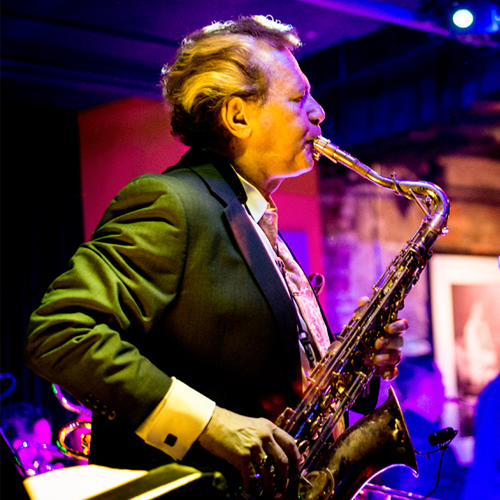29
“The Music of Quincy Jones, Oliver Nelson, & Thad Jones” feat. Ernie Krivda & the Fat Tuesday Big Band The 18-piece "Band That Swings" makes a roarin' return to the Rubber City with an exciting themed program paying tribute to three titans of big band jazz!
The hard-swingin’ 18-piece Fat Tuesday Big Band, lead by legendary tenor saxophonist, Ernie Krivda, presents a very special show in their return to BLU! As one of the most energetic and talented groups in the Midwest, the FTBB will converge at Main & Market for an unforgettable night of blues, bop, ballads, boogie and shout as they present the music of prolific composers & arrangers: Quincy Jones, Oliver Nelson, and Thad Jones!
The great rhythm section of Joe Hunter (piano), Peter Dominguez (bass), and Val Kent (drums), will lay it down for soloists like Dave Sterner (alto sax), Mark Mauldin (trombone), Tony Spicer (tenor sax), and of course, the band’s leader, acclaimed tenor saxophonist, Ernie Krivda. Some of the tunes showcased include Air Mail Special, Manteca, Walk on the Wild Side, Evil Man Blues, and Walking in Space!
Great musicianship, stylish distinction, and transcendent energy are a hard combination to beat, so don’t miss your chance to hear this band live right here in Akron – get your tickets today!
About the Fat Tuesday Big Band
Whether in concert or playing swinging dance music, Ernie Krivda and The Fat Tuesday Big Band are one of the most exciting and engaging acts to hit the Midwest music scene in recent memory. The band reflects the electric intensity of their leader as well as his superb musicianship and stylistic distinction. Combining the musical values of the great big bands of yesterday with the dramatic energy of a new century, the nineteen piece “Band That Swings” plays each performance into an unforgettable event.
The Fat Tuesday Big Band features an explosive chemistry, mixing consummate veteran talent with rising starts. Their newest CD (Body & Soul) features the talents of the new vocal sensation Erin Kufel. The addition of her strong vocal component is part of the continuing expansion of the bands expressive range. To partner with its signature “joie de vive”, the Fat Tuesday Big Band’s ballad style has evolved and matured, in its thirteen plus years, into a powerful and moving experience.
The audiences of Northeast Ohio consider the FTBB to be a treasure. Their feeling is based on more than just regional pride, as they have had the opportunity to compare them, on a number of occasions, to some of the great bands of the day. A resurgence of the “battle of the bands” marketing concept has found them representing the area in duels with Roger Humphries’ swinging Pittsburgh band, George Gee’s polished New York City aggregation, and the great Count Basie Orchestra. The Fat Tuesday Big Band has always been able to successfully defend its turf. Great musicianship, stylish distinction, and transcendent energy are a hard combination to beat. Get your tickets today!
About Quincy Jones
An impresario in the broadest and most creative sense of the word, Quincy Jones’ career has encompassed the roles of composer, record producer, artist, film producer, arranger, conductor, instrumentalist, TV producer, record company executive, magazine founder, multi-media entrepreneur and humanitarian. As a master inventor of musical hybrids, he has shuffled pop, soul, hip-hop, jazz, classical, African and Brazilian music into many dazzling fusions, traversing virtually every medium, including records, live performance, movies and television.
Celebrating more than 60 years performing and being involved in music, Quincy’s creative magic has spanned over six decades, beginning with the music of the post-swing era and continuing through today’s high-technology, international multi-media hybrids. In the mid-50’s, he was the first popular conductor-arranger to record with a Fender bass. His theme from the hit TV series Ironside was the first synthesizer- based pop theme song. As the first black composer to be embraced by the Hollywood establishment in the 60’s, he helped refresh movie music with badly needed infusions of jazz and soul. His landmark 1989 album, Back On The Block–named “Album Of The Year” at the 1990 Grammy Awards– brought such legends as Dizzy Gillespie, Ella Fitzgerald, Sarah Vaughan and Miles Davis together with Ice T, Big Daddy Kane and Melle Mel to create the first fusion of the be bop and hip hop musical traditions; while his 1993 recording of the critically acclaimed Miles and Quincy Live At Montreux, featured Quincy conducting Miles Davis’ live performance of the historic Gil Evans arrangements from the Miles Ahead, Porgy and Bess and Sketches of Spain sessions, garnered a Grammy Award for Best Large Jazz Ensemble Performance. As producer and conductor of the historic “We Are The World” recording (the best-selling single of all time) and Michael Jackson’s multi-platinum solo albums, Off The Wall, Bad and Thriller (the best selling album of all time, with over 50 million copies sold), Quincy Jones stands as one of the most successful and admired creative artist/executives in the entertainment world.
About Oliver Nelson
Born June 4, 1932 in St. Louis, Oliver Nelson came from a musical family: His brother played saxophone with Cootie Williams in the Forties, and his sister was a singer- pianist. Nelson himself began piano studies at age six and saxophone at eleven. In the late ‘40’s he played in various territory bands and then spent 1950-51 with Louis Jordan’s big band. After two years in a Marine Corps ensemble, he returned to St. Louis to study composition and theory at both Washington and Lincoln universities.
After graduation in 1958, Nelson moved to New York and played with Erskine Hawkins, Wild Bill Davis, and Louie Bellson. He also became the house arranger for the Apollo Theatre in Harlem. Though he began recording as a leader in 1959, Nelson’s breakthrough came in 1961 with “The Blues and the Abstract Truth,” (Impulse) featuring an all- star septet of; Eric Dolphy, Bill Evans, Roy Haynes, Paul Chambers and Freddie Hubbard. With the success of that deservedly acclaimed album, Nelson’s career as a composer blossomed, and he was subsequently the leader on a number of memorable big-band recordings, including “Afro-American” (Prestige) and “Full Nelson” (Verve). He also became an in-demand studio arranger, collaborating with Cannonball Adderley, Johnny Hodges, Stanley Turrentine, and others. In addition to dates he led under his own name, he wrote, scored and conducted under the names Leonard Feather’s Encyclopedia of Jazz All Stars and the Jazz Impressions Orchestra; did a date for Shirley Scott and another for Ray Brown and Milt Jackson; five sessions with organist Jimmy Smith, including the legendary “Walk on the Wild Side,” another headlined by Smith and Wes Montgomery; and the incomparable Pee Wee Russell. During the Sixties, Nelson became one of the most strongly identifiable writing voices in jazz. Since Nelson was schooled in both the American jazz and European music traditions, his arrangements can be intricate, but when it comes time for a solo, it’s clear that Nelson (who was himself a brilliant soloist on tenor alto and soprano saxophone) has fashioned everything as the proper set up for the featured player.
Nelson moved to Los Angeles in 1967, where he became involved extensively in scoring for television and films. It’s no wonder Oliver Nelson was so eagerly embraced by Hollywood – his music is all about drama. He loved painting tonal pictures, and his pieces do portray dramatic situations perfectly.
He continued active in jazz and continued to lead an all-star big band in various live performances between 1966 and 1975 in appearances in Berlin, Montreux, New York, and Los Angeles, he also toured West Africa with a small group. Besides composing music for television and films, he was producing and arranging for pop stars such as Nancy Wilson, James Brown, the Temptations, and Diana Ross.
About Thad Jones
Thaddeus Joseph Jones (March 28, 1923 – August 21, 1986) was an American jazz trumpeter, composer, and bandleader.
He was born in Pontiac, Michigan to a musical family of ten (an older brother was pianist Hank Jones and a younger brother was drummer Elvin Jones). Thad Jones was a self taught musician, performing professionally by the age of sixteen. He served in U.S. Army bands during World War II (1943-46).
After the war, Thad Jones continued his professional music career, eventually winding up with Count Basie in 1954, for whom he arranged, composed, and performed. He stayed with Basie for nine years. Thad achieved critical acclaim during this time, but not for his work with Basie. Much of Jones’s music was stylistically original and didn’t always fit in with the Basie group which he left in 1963. In the early sixties he became a free lance arranger and performer in the New York area.
In 1965 he and drummer Mel Lewis formed the Thad Jones/Mel Lewis Big Band. The group initially began with informal late night jam sessions amongst New York’s top studio musicians. The group eventually began performing at the Village Vanguard, to wide acclaim, and continued with Jones in the lead for twelve years. In 1979 they won a Grammy Award for their album Live in Munich. Jones also taught at William Paterson College in New Jersey.
In 1978 Thad suddenly moved to Copenhagen, Denmark, (to the great surprise of his New York band mates), where several other American jazz musicians had gone to live. There, he formed a new band Eclipse, composed for The Danish Radio Big Band and taught jazz at the Royal Danish Conservatory in Copenhagen.
A year before his death, Jones came back to the U.S. to lead the Count Basie Orchestra but had to step down due to ill health. He returned to his home in Copenhagen for the last few months of his life. He died on August 21, 1986 after being hospitalized for months but his cause of death was not published. At the time of his death he had a six year old child, also named Thad Jones, with his wife Lis Jones. He is buried there in the Vestre Kirkegard Cemetery (Western Churchyard Cemetery).
Charles Mingus called Jones “…the greatest trumpet player I’ve heard in this life.” In later years his playing ability was overshadowed by his composing and arranging skills. His best known composition is the standard A Child is Born.
$22
Contact
BLU Jazz+
47 E. Market Street
Akron, OH 44308
(330) 252-1190
Open Tuesday & Thursday-Saturday, 7pm - 11:30pm
|
|
BLU Jazz+ named one of the "Best International Jazz Venues" by DownBeat Magazine |
|
|
Committed to the preservation of America's treasured art form of jazz, BLU Jazz+ Masterclass Foundation (BJMF) is a new program developed by the founders of BLU Jazz+ Akron that brings “front-row” jazz education performance & mentorship opportunities to student musicians and art lovers alike through an ongoing series of special events throughout the year. |
Partners
Copyright 2014-2024, BLU Jazz+, all rights reserved.









